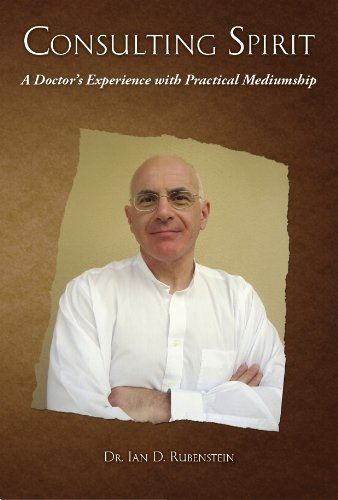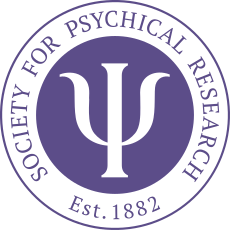
Reviewed by Tom Ruffles
Dr Ian Rubenstein, a full-time General Practitioner in Enfield, North London, is also a practising medium, an unusual combination. While you might expect a doctor to keep such extra-curricular activities quiet, Rubenstein is far from coy in publicising his dual role. In 2009 he appeared in a Channel 4 documentary called Talking to the Dead, about Vestry Road Spiritualist Church, Walthamstow, which he attends, and he has now written what I suppose we might characterise as a spiritual autobiography.
On the face of it, someone from the hard sciences does not seem likely to become a medium giving stage demonstrations at a Spiritualist church. Rubenstein had no strong religious beliefs growing up, coming from a secular background, and no particular interest in the paranormal, though he had had a couple of strange experience when younger which may have indicated exceptional sensitivity.
The most dramatic of these occurred at the age of 19 and involved seeing a woman’s face transfigured into that of some kind of “snow queen”, a kind of guardian spirit of the person, which he felt was somehow able to see into his soul and divine his ignoble motives. His younger sister, who was present, saw something odd happening as well, weird enough to make her scream. She later confirmed that some kind of change had occurred in the person’s face, supporting Rubenstein’s experience and perhaps raising the possibility of a genetic component to the experience.
But these episodes he put to one side, and concentrated on his career and family life. Then one day a patient came in to have his blood pressure checked, and proceeded to tell Rubenstein that the doctor’s deceased grandfather was present and had a message. There followed a twenty-minute session with Rubenstein being told numerous things about himself and his family in conditions which, if described accurately, would seem to suggest limited scope for cold reading. But then, to undermine the strength of the message, he is told to expect a visit that evening from his brother who had grown up in the spirit world after their mother miscarried him. The brother does not show, leaving Rubenstein uncertain what to believe.
Despite this uneven contact with mediumship, there was enough there to intrigue him. Rubenstein gradually became convinced that he too had paranormal abilities through intuitions, and the book details his journey exploring them, and finding out how to use them to best advantage to help people in conjunction with his more conventional role as a doctor. This is a steep learning curve, and a time-consuming one, so all credit to his wife Punam for her tolerance of the amount of effort he has to put in on top of a busy career and many trips to the gym.
Throughout he has tried to keep an open mind, and not dismiss out of hand his experiences, and those reported by others, however odd. He joined a development circle at the Spiritualist Church, and while not embracing the religious component of Spiritualism, he did become open to a reality beyond that our senses can perceive, developing to the point where he was able to stand on a stage himself and transmit messages from the departed.
His burgeoning psychic abilities were indicated by odd little circumstances, for example a feeling that his keys would be stolen from his office and his car broken into, which it duly was; the lesson, listen to your intuition when it’s talking to you, and don’t bat it away Being mediumistic and working in a medical capacity though led to a blurring of boundaries which he was acutely aware could lead to problems (I was expecting him to state at some point that a complaint had been made to the General Medical Council by a scandalised patient with whom he had been too forthright about the source he claimed for his information). However, it is clear that he does not rely on his spirit guides to help him with diagnoses, though they do help with counselling patients.
In addition to his involvement as a stage medium he recounts his interest in the paranormal more generally, describing visits to Stansted Hall and a conference run by the Scientific and Medical Network, and conversations with researchers Maurice Grosse and Gary Schwartz. He admits he has no full answers despite his lengthy investigation. He was though able to go to the aid of friends and sort out a poltergeist that was bothering them, but then the interpersonal skills that he already possessed are a large part of dealing with such incidents.
As well as an exploration of his own spirituality and development of mediumistic abilities, the book is an affectionate portrait of those in the Spiritualist movement on the terrestrial plane with whom Rubenstein comes into contact. There is a chalk and cheese element to this as he is accused by them of over-thinking his situation, when, rather than doing too much questioning, they argue that he should just accept Spirit. He takes a sceptical stance all the way through to his experiences, such as trying parsimoniously to attribute his spirit guides to his own subconscious, much to the bemusement of his mentors at the Spiritualist church, who take an uncomplicated view of their reality. Such unwillingness to probe too deeply into matters of evidence many outsiders find difficult to accept, and makes Consulting Spirit rather different to much Spiritualist literature. Where others would have embraced the strangeness uncritically, he is seen to challenge it, and look for alternative explanations.
There is always the issue of whether he uses his conventional sensitivity based on longstanding clinical experience, merely attributing it to Spirit, but a good example of how this could not have been the case was when he became convinced that a child who had swallowed a pen cap had it lodged in her lung, without seeing her and without any indications in her behaviour that this is what had occurred. Despite initial reports that the child was fine, the cap was indeed found in her lung, and safely removed. His readings on stage were often similarly highly accurate according to his account, though there with the benefit of having the person for whom he was doing the reading in front of him.
One thing that does grate, at least to an English reader, is the use of American English vocabulary which makes for some curious language, given the London setting, not least Rubenstein’s description of himself as a “primary care physician”, not a term much used in Enfield I’ll be bound. But that seems to be our fault – he could not interest a UK publisher in his story and the manuscript was snapped up by Anomalist Books, for whom he changed the text to suit an American audience.
Despite the language issue, this is an extremely readable book. Its author comes across as completely honest, with no position to defend, but taking the reader where he sees the evidence leading him. As a person he seems very nice, sociable, and much more open about himself with patients than the doctors I have come across. There is a sense that his willingness to try new things provides a flexibility which can assist him to integrate his spiritual life into his everyday one more easily than would be the case with a person more mentally rigid.
It has to be said that while he does try throughout to examine the evidence, there is nothing here that will trouble the sceptic, who will be happy to dismiss it all as anecdotal, and make the usual accusations of possible misperception, selective memory, ignoring of misses, cryptomnesia, exaggeration, etc. Rubenstein’s good faith is certainly not in doubt. This is not his career, and he has nothing to gain, not even status or self-esteem, by telling lies. As a well-paid GP he is certainly not in it for the money. Those willing to entertain the possibility that something really is going on here will find Consulting Spirit (a great punning title) an unusual but very useful case study.

